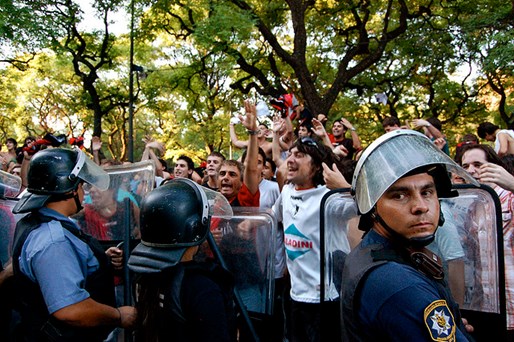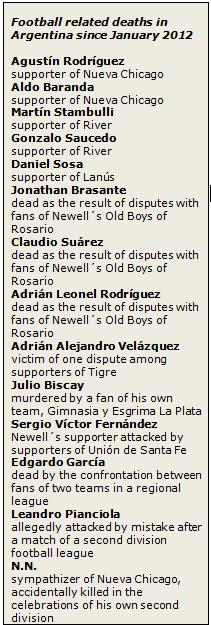More football violence in Argentina and new tragedies in South America

14 people were killed in Argentina since January 2012 due to football related violence. Photo: Supporters of Argentinean football club Newell's by Flickr/Joelr
18.04.2013
By Javier SzlifmanFrom January 2012 to March 2013, 14 fans have died in incidents linked to football; the total list of football related deaths now counts 274. The situation is also daunting in other countries in South America, a region which will host the next Football World Cup and Olympic Games.
10 of the 14 Argentinean victims since January 2012 have lost their lives in confrontations with supporters of their own team. This number is a clear proof of the modern violence in Argentinean football, which frequently takes place through confrontations between fans of the same team, who with blows and fire arms, try to keep the money raised by the ´barra brava´, the fanatical fan groupings in Argentina. From early 2012, internal confrontations have been registered in the supporter groups of Boca Juniors, River Plate, Vélez, Independiente, Quilmes, Nueva Chicago, Newell´s and Lanús, among other teams.  Only two fans died in 2012 as a consequence of incidents between rival supporters. All the victims are young and both fire arms and bladed weapons abound in the incidents.
Only two fans died in 2012 as a consequence of incidents between rival supporters. All the victims are young and both fire arms and bladed weapons abound in the incidents.
In this context, Javier Cantero, president of top Argentinean football club Independiente since 2011, carried out a fight by taking away the money and the privileges supporters had been awarded with by former managers. However, he received little backing from his colleagues.
His fight suffered a hard blow last February, when Florencia Arietto, advocate in charge of the security of the club, resigned from her post due to disagreement with the president on the measures required to eradicate violence. Another woman who moved away from the world of Argentinian football in the last months is Mónica Nizzardo, founder of the association “Let's save football” (Salvemos al Futbol).
“Today I confirm what many have tried to explain to me and what I was unable to take in: violence in Argentinian football hasn´t got a solution”, Nizzardo wrote in her letter of resignation.
She added: “The perversity in Argentinian football is extreme; everybody admits it, but as if it was a terminal illness without a cure: instead of trying to find an antidote, they try to live with it.”
Violence and the big events in South America
Violence in football is not only an issue in Argentina and at times its consequences are unforeseeable. On 12th December 2012, the final match in the South American Football Cup between San Pablo, from Brasil and Tigre, from Argentina, was cancelled in the break, after the Argentinian football players reported assault with weapons by the security guards in the dressing rooms.
Joseph Blatter, president of FIFA, confirmed the events later: “Such an incident that has just happened is a warning for organizers of the World Cup of what can happen. But security is not a matter of the sports organization but of the authorities be it the police or the army”.
Just from January till September 2012, Brazil registered a record of 23 deaths related to football. Last January, the night club Kiss caught on fire in the city Santa María, in the south of Brazil, which caused 233 deaths and 116 casualties.
FIFA General Secretary, Jerome Valcke, rapidly reported to the Brazilian press:
“Our thoughts are with the families of the victims of this tragedy. Nonetheless, this event has nothing to do with the security of the stadiums during the FIFA Confederations Cup and the 2014 World Cup”.
Sources of the Brazilian Olympic Committee also hushed up any relationship with Brazil´s capability to organize massive events. As a result of this, the festivities which would set off the final countdown of 500 days to the beginning of the 2014 World Cup, were cancelled.
Another tragedy took place on 20th February this year when Kevin Beltrán, a sympathizer of San José of Bolivia, died in an encounter between his team and the Corinthians of Brazil for Libertadores Cup. Beltrán was hit on his head by a firecracker, which had been thrown by Brazilian fans; he was 14 years old. 12 supporters of Corinthians were detained because of the incident.
At the beginning of last year, Bolivian football saw the death of José Montaño Viera, supporter of Blooming, who became the first victim related to sports in his country.
The future of violence
In September 2013, the 125th Session of International Olympic Committee (IOC) will take place in Buenos Aires. There, the host of the 2020 Olympic Games will be chosen; which sports will compete will be determined and a new president of the IOC will be assigned. But most likely nobody will speak about the phenomenon of violent acts of football in either Argentina or in any other country in the region.
Besides the above described events in Argentina, Brazil and Bolivia, other Latin American countries suffered from incidents surrounding football.
In November 2012, George Michael Murrillo, 20 years old, supporter of Barcelona of Ecuador, was attacked by a sympathizer of another Ecuadorian club, Emelec, and died.
Last February, Alberto Fabián Valdez Estigarribia, a young sympathizer of Cerro Porteño de Paraguay, died after the encounter with his peers of Olympia.
In Uruguay, in early 2013, the government of the country and the board of the Uruguayan Football Association called off all football encounters after serious confrontations among football players of Nacional and Peñarol, the two most important teams in Uruguay.
Recently, serious incidents have been registered in encounters of the Mexican league which set off the alarm in that country.
In Chile and Ecuador, measures to try to change the scene have recently been passed. The efficiency of the regulations is to be seen.
Meanwhile, FIFA and many football managers have left the topic in the hands of security organisations.





